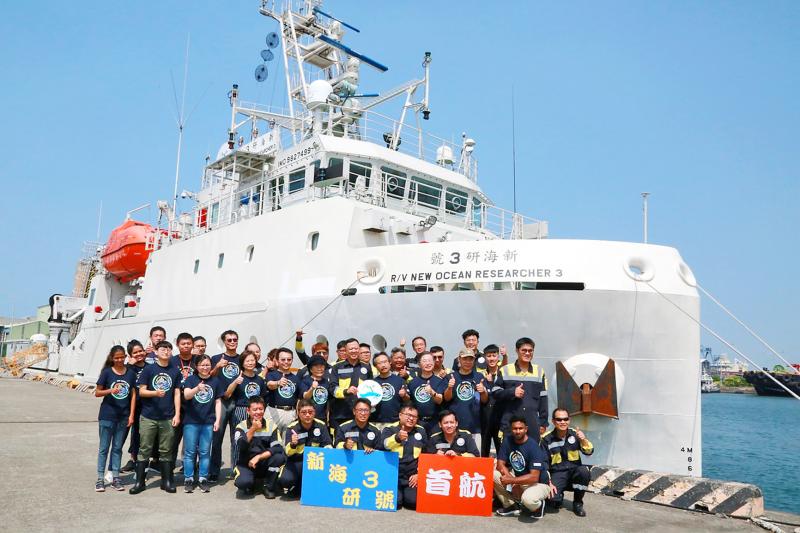While some foreign research vessels are suspending operations due to the COVID-19 pandemic, Taiwan is mostly unaffected, with those boarding research vessels required to take regular measures to protect against the disease.
The US University-National Oceanographic Laboratory System (UNOLS), which coordinates oceanographic research vessel use across 59 academic institutions, on March 13 halted operations on its vessels for 30 days, later extending the restriction until July, the weekly magazine Eos, Transactions, American Geophysical Union reported.
In Taiwan, most ocean research appears to be unaffected, despite cluster infections having been reported on the navy supply ship Panshih (磐石) and foreign cruises.

Screengrab from the Web site of National Sun Yat-sen University
National Sun Yat-sen University’s (NSYSU) R/V New Ocean Researcher 3 on Wednesday embarked on its first scientific voyage to the north of the South China Sea, the school said, adding that it is to return tomorrow.
Sixteen crew and technicians, as well as eight researchers, would be involved in surveying the carbon cycle and microplastics in the deep ocean, said the voyage’s lead scientist Hung Chin-chang (洪慶章), the vice dean of NSYSU’s College of Marine Sciences.
Hung said that anyone showing suspected symptoms of COVID-19 would be isolated in the ship’s healthcare room, and the team would immediately inform the university to make arrangements.
The ship would not dock on any islands, while the team would follow disease prevention measures, such as checking their temperatures twice a day, using personal eating utensils, and sanitizing public facilities daily, he said, adding that the supply of masks on the ship was sufficient.
Separately, Taiwan Ocean Research Institute Director Wang Chau-chang (王兆璋) said that most of the R/V Legend’s (勵進) voyages were unaffected by the pandemic, except a trip scheduled to dock in Manila in early March that was canceled due to the outbreak in the Philippines.
Most of the Legend’s missions were conducted in nearby waters, such as near Itu Aba Island (Taiping Island, 太平島) in the South China Sea or the Okinawa Trough in the East China Sea, from which it could sail back to Taiwan within three days, Wang said.
The Legend can carry 43 people, including crew and scientists, at full capacity, he added.
The institute, NSYSU and National Taiwan Ocean University, which operates the New Ocean Researcher 2, have prepared preventive and response plans, including daily temperature checks, the wearing of masks, dining rules and the sanitation of facilities, the Ministry of Science and Technology said in a statement on Friday.
The vessels are equipped with satellite communication systems, and people on board can contact the Coast Guard Administration for help if needed, it added.
The New Ocean Researcher 1, now maintained by CSBC Corp, Taiwan at its shipyard in Keelung, has not yet been transferred to National Taiwan University’s Institute of Oceanography, but the latter said that it has pre-emptively introduced a response plan.

Former Czech Republic-based Taiwanese researcher Cheng Yu-chin (鄭宇欽) has been sentenced to seven years in prison on espionage-related charges, China’s Ministry of State Security announced yesterday. China said Cheng was a spy for Taiwan who “masqueraded as a professor” and that he was previously an assistant to former Cabinet secretary-general Cho Jung-tai (卓榮泰). President-elect William Lai (賴清德) on Wednesday last week announced Cho would be his premier when Lai is inaugurated next month. Today is China’s “National Security Education Day.” The Chinese ministry yesterday released a video online showing arrests over the past 10 years of people alleged to be

THE HAWAII FACTOR: While a 1965 opinion said an attack on Hawaii would not trigger Article 5, the text of the treaty suggests the state is covered, the report says NATO could be drawn into a conflict in the Taiwan Strait if Chinese forces attacked the US mainland or Hawaii, a NATO Defense College report published on Monday says. The report, written by James Lee, an assistant research fellow at Academia Sinica’s Institute of European and American Studies, states that under certain conditions a Taiwan contingency could trigger Article 5 of NATO, under which an attack against any member of the alliance is considered an attack against all members, necessitating a response. Article 6 of the North Atlantic Treaty specifies that an armed attack in the territory of any member in Europe,

LIKE FAMILY: People now treat dogs and cats as family members. They receive the same medical treatments and tests as humans do, a veterinary association official said The number of pet dogs and cats in Taiwan has officially outnumbered the number of human newborns last year, data from the Ministry of Agriculture’s pet registration information system showed. As of last year, Taiwan had 94,544 registered pet dogs and 137,652 pet cats, the data showed. By contrast, 135,571 babies were born last year. Demand for medical care for pet animals has also risen. As of Feb. 29, there were 5,773 veterinarians in Taiwan, 3,993 of whom were for pet animals, statistics from the Animal and Plant Health Inspection Agency showed. In 2022, the nation had 3,077 pediatricians. As of last

XINJIANG: Officials are conducting a report into amending an existing law or to enact a special law to prohibit goods using forced labor Taiwan is mulling an amendment prohibiting the importation of goods using forced labor, similar to the Uyghur Forced Labor Prevention Act (UFLPA) passed by the US Congress in 2021 that imposed limits on goods produced using forced labor in China’s Xinjiang region. A government official who wished to remain anonymous said yesterday that as the US customs law explicitly prohibits the importation of goods made using forced labor, in 2021 it passed the specialized UFLPA to limit the importation of cotton and other goods from China’s Xinjiang Uyghur region. Taiwan does not have the legal basis to prohibit the importation of goods